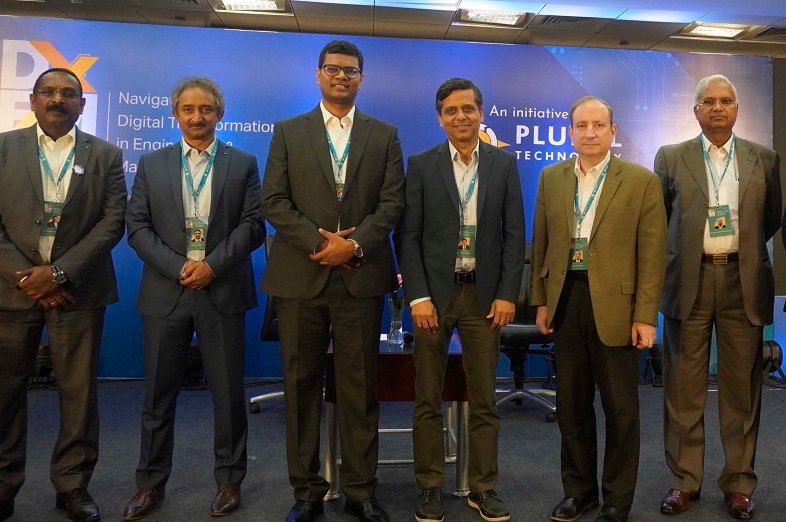Hyderabad, May 24, 2024….The Technology enables drug discovery faster, more efficiently and cheaper, said Mr Deepak Sapra, CEO of Dr. Reddy’s Laboratories while delivering an opening address at DXEM 2024–a day-long Summit on Navigating Digital Transformation in Engineering and Manufacturing initiated by Hyderabad-based Plural Technology, organised at HICC Madhapur on Friday to sensitise relevant industries on the importance of Digital Transformation in Engineering & Manufacturing sector.
Deepak Sapra, a prominent leader from the pharmaceutical industry said, that with so many new waves of technologies around such as AI and Machine Learning, the vast amounts of data both drug and molecular data, can be harnessed to build complex models automatically. This makes the drug discovery process far easier—and faster—to predict how drugs might behave in the body, allowing many early experiments.
Speaking further he added drug discovery is a very complex affair. It takes anywhere from 10 to 15 years. It is a very costly affair. It involves US $ 2billion, INR 16000 crore. After so much effort, the probability of success is just 1 in 10,000, probability is not more than 3O%. Even after so much, the price control on the companies by regulators is another challenge that looms large. The only few ways to address these challenges are Innovation and collaboration powered by Technology.

Our healthcare lies in our mobile phones. The biggest diagnostic device is our mobile phone and why don’t we use it? It transforms a large diagnostic lab into our palm which is always with you and follows you like your shadow.
To prove his point on the role of technology in drug discovery he spoke about personalised medicine, which he described as precision medicine that enables different medicines to different people suffering from the same disease. The medicine is tailored to the individual patient based on his or her predicted response or risk of disease.
This is not new. It has been existing for well over a decade. But it is making a comeback in a big way now, said Deepak Sapra. He shared a few examples such as MYCIN and IBM WATSON.
MYCIN is a knowledge-based consultation program for infectious disease diagnosis. This consultation system is designed to assist physicians in the diagnosis of and therapy selection for patients with bacterial infections. In addition to that it gives an explanation system which can answer simple English questions to justify its advice or educate the user. It is believed to have done better than an actual doctor he said.
IBM Watson is used to help doctors diagnose diseases by analyzing patient data and identifying patterns that may indicate a particular condition. Both are revolutionary products that work on patients’ data. But unfortunately failed as they were not user-friendly.
The research is on personalised medicines, not just in Western countries but here in India, he added. Car T, a unique cancer individual medicine, is gaining ground now. The world will see at least 15 to 20 new drugs in this area, Deepak added.
More and more pharmaceutical companies are increasingly spending a higher percentage of amount on R & D. Some are spending as high as 48% of their revenues and some are spending even more, he said.
By automating the drug discovery process, you can reduce the time and resources required to identify promising drug candidates, he added. Technology helps to transform from I to We, illness to wellness, he added.
The data required for technology-driven decision-making is key. The data is huge, an individual produces 1100 terabytes of data every year. The power lies in analysing that data.
Further, Deepak added that the animals used in clinical trials can be replaced by simulated modes. AI and technology can be optimised. This can save time by 25 to 30%. The regulators such as USFDA (The Food and Drug Administration (FDA); European Medicines Agency (EMA); Central Drugs Standard Control Organization (CDSCO) are now recognising the importance of technology in drug discovery. The pace of technology is much more and regulatory bodies need to catch up with the pace of technology, Deepak said. Every serious regulatory body in the world is making earnest attempt, he added.
Peter Bilello, CEO, and President, of CIM Data delivered a Keynote address on Digital Transformation and said digital enablement starts with end-to-end connectivity and ends with digital skills transformation.
Giving opening remarks earlier Sunil Savaram, Founder & CEO, of Plural Technology, the company specialized in Product Lifecycle Management (PLM) and Enterprise Software services said if you don’t go digital, you might be washed away by those who have gone digital. It is like a shape-up or ship-out. Automate and elevate your business. You will lose out on competitiveness if you remain in the brick-and-mortar model. Thrive, not vanish. Our mission is to help companies thrive and become more competitive.
According to recent studies, embracing digitalization in manufacturing could potentially add USD 1.04 trillion to India’s GDP by 2025, representing a significant boost to the economy, Sunil added.
South Korea spends 5.2% of its profits on R & D. Against this India spends just 0.8%. So, it is better to invest in technology and improve your engineering efficiency. Thrive with the might of technology and not vanish, he said.
The day-long summit saw a panel discussion moderated by Dr Ramgopal NC, Technology & Innovation Director, Spantech Engineers, ex-Program Director of Emirates ID and led large-scale digital transformation projects for the Government. The panellists of the same included Mr Sudhakar Rao, APAC Head, Ui Path; Dr Rajaram Iyer, VP, Lauras Labs; Mr Siva Kumar Rachakonda, President, Zetatek Group; Mr Dhanraj Tirumala, Founder & CEO, CGI Simulations Pvt Ltd.
Few successful case studies were discussed.
Over 100 industries of engineering and manufacturing sectors participated.

